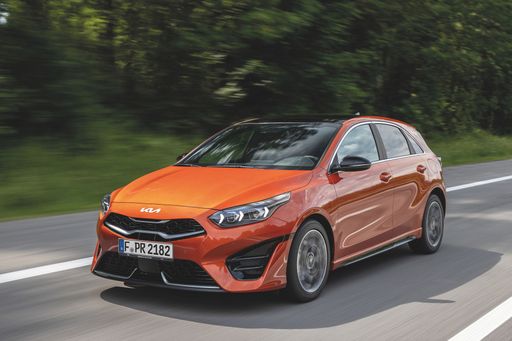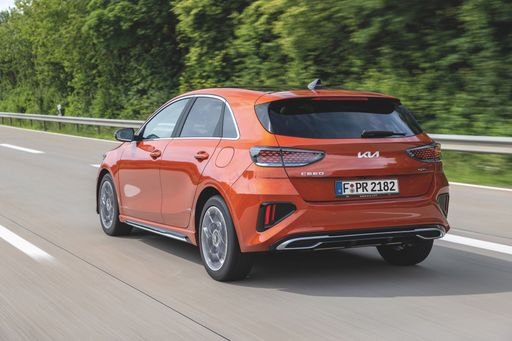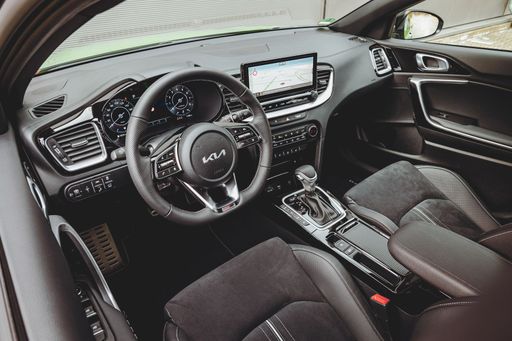Kia Ceed vs Peugeot 208 - Differences and prices compared
Compare performance (140 HP vs 156 HP), boot space and price (23500 £ vs 20700 £ ) at a glance. Find out which car is the better choice for you – Kia Ceed or Peugeot 208?
Costs and Efficiency:
Looking at overall running costs, both models reveal some interesting differences in everyday economy.
Peugeot 208 has a a bit advantage in terms of price – it starts at 20700 £ , while the Kia Ceed costs 23500 £ . That’s a price difference of around 2795 £.
Fuel consumption also shows a difference: Peugeot 208 manages with 4.50 L and is therefore noticeable more efficient than the Kia Ceed with 6 L. The difference is about 1.50 L per 100 km.
Engine and Performance:
Power, torque and acceleration say a lot about how a car feels on the road. This is where you see which model delivers more driving dynamics.
When it comes to engine power, the Peugeot 208 has a somewhat edge – offering 156 HP compared to 140 HP. That’s roughly 16 HP more horsepower.
In acceleration from 0 to 100 km/h, the Peugeot 208 is a bit quicker – completing the sprint in 8.30 s, while the Kia Ceed takes 9.50 s. That’s about 1.20 s faster.
There’s also a difference in torque: Peugeot 208 pulls slight stronger with 270 Nm compared to 253 Nm. That’s about 17 Nm difference.
Space and Everyday Use:
Cabin size, boot volume and payload all play a role in everyday practicality. Here, comfort and flexibility make the difference.
Both vehicles offer seating for 5 people.
In curb weight, Peugeot 208 is slightly lighter – 1165 kg compared to 1298 kg. The difference is around 133 kg.
In terms of boot space, the Kia Ceed offers somewhat more room – 395 L compared to 352 L. That’s a difference of about 43 L.
When it comes to payload, Kia Ceed somewhat takes the win – 490 kg compared to 430 kg. That’s a difference of about 60 kg.
Who wins the race in the data check?
The Peugeot 208 is decisively ahead in the objective data comparison.
This result only shows which model scores more points on paper – not which of the two cars feels right for you.
Costs and Consumption
View detailed analysis
Engine and Performance
View detailed analysis
Dimensions and Body
View detailed analysis

Peugeot 208
Kia Ceed
The Kia Ceed is a sensible, stylish hatchback that gives buyers more than they'd expect for the money, blending practical space with crisp, modern looks. It drives with measured confidence and comes loaded with user-friendly kit, so you can enjoy daily life behind the wheel without breaking into a sweat.
details


Peugeot 208
The Peugeot 208 feels like a city-savvy fox: compact, stylish and surprisingly grown-up, with a cabin that punches above its weight and enough personality to make daily commutes a little less boring. It’s a smart pick for buyers who want chic practicality without the showroom bluster — easy to park, thrifty to run and oddly fun when the road tightens up.
details



Costs and Consumption |
|
|---|---|
|
Price
23500 - 26300 £
|
Price
20700 - 35200 £
|
|
Consumption L/100km
6 - 6.4 L
|
Consumption L/100km
4.5 - 5.2 L
|
|
Consumption kWh/100km
-
|
Consumption kWh/100km
14.1 - 15.4 kWh
|
|
Electric Range
-
|
Electric Range
362 - 432 km
|
|
Battery Capacity
-
|
Battery Capacity
46 - 51 kWh
|
|
co2
137 - 146 g/km
|
co2
0 - 117 g/km
|
|
Fuel tank capacity
-
|
Fuel tank capacity
44 L
|
Dimensions and Body |
|
|---|---|
|
Body Type
Hatchback
|
Body Type
Hatchback
|
|
Seats
5
|
Seats
5
|
|
Doors
-
|
Doors
5
|
|
Curb weight
1298 - 1372 kg
|
Curb weight
1165 - 1530 kg
|
|
Trunk capacity
357 - 395 L
|
Trunk capacity
309 - 352 L
|
|
Length
-
|
Length
4055 mm
|
|
Width
1800 mm
|
Width
1745 mm
|
|
Height
-
|
Height
1430 mm
|
|
Max trunk capacity
-
|
Max trunk capacity
1118 - 1163 L
|
|
Payload
478 - 490 kg
|
Payload
380 - 430 kg
|
Engine and Performance |
|
|---|---|
|
Engine Type
Petrol, Petrol MHEV
|
Engine Type
Petrol, Electric, Petrol MHEV
|
|
Transmission
Manuel, Automatic
|
Transmission
Manuel, Automatic
|
|
Transmission Detail
Manual Gearbox, Dual-Clutch Automatic
|
Transmission Detail
Manual Gearbox, Reduction Gearbox, Dual-Clutch Automatic
|
|
Drive Type
Front-Wheel Drive
|
Drive Type
Front-Wheel Drive
|
|
Power HP
100 - 140 HP
|
Power HP
101 - 156 HP
|
|
Acceleration 0-100km/h
9.5 - 13.2 s
|
Acceleration 0-100km/h
8.3 - 10.9 s
|
|
Max Speed
-
|
Max Speed
150 - 200 km/h
|
|
Torque
172 - 253 Nm
|
Torque
205 - 270 Nm
|
|
Number of Cylinders
3 - 4
|
Number of Cylinders
3
|
|
Power kW
74 - 103 kW
|
Power kW
74 - 115 kW
|
|
Engine capacity
998 - 1482 cm3
|
Engine capacity
1199 cm3
|
General |
|
|---|---|
|
Model Year
2024
|
Model Year
2023 - 2025
|
|
CO2 Efficiency Class
E
|
CO2 Efficiency Class
D, A, C
|
|
Brand
Kia
|
Brand
Peugeot
|
What drivetrain options does the Kia Ceed have?
The Kia Ceed is available as Front-Wheel Drive.




